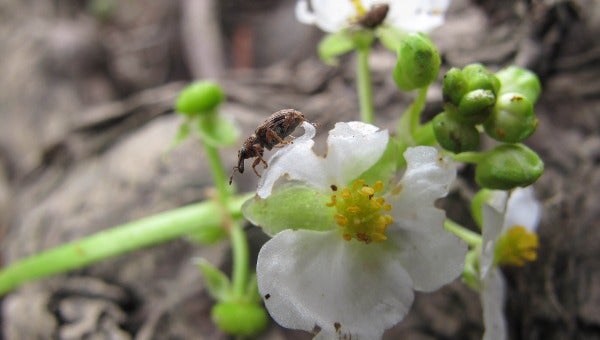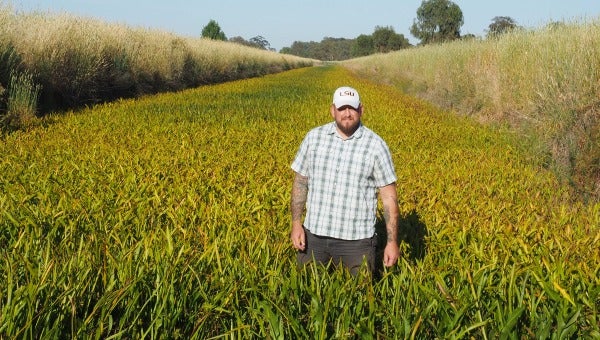ERDC researcher aids work in Australia, South Africa to combat invasive weed
Published 4:52 pm Monday, February 27, 2023
For more than a decade, Dr. Nathan Harms, a research biologist with the U.S. Army Engineer Research and Development Center’s (ERDC) Environmental Laboratory (EL), has been assisting the Australian government, and more recently South Africa, with the biological control of the invasive delta arrowhead.
The delta arrowhead, Sagittaria plattyphylla, is a valuable native wetland plant in the U.S. The plant is used extensively in restoration and is a significant food resource for wildlife. However, after being introduced in Australia and South Africa, it has invaded agricultural canals and natural waterways.
“The most significant impact of delta arrowhead invasion is the obstruction of water flow in drains and channels,” said Harms. “This causes flooding, particularly during periods of high flow or rainfall, and inefficiencies in water delivery.”
Infestations in irrigation channels affect the reliability of water delivery to farms, reducing the capacity to deliver the right amount of water at the right time, which can lead to production losses or increased costs. Damage to irrigation infrastructure can also be significant.
“Herbicide applications for control of delta arrowhead in Australia often result in variable levels of control that are not consistent between locations and time of application,” said Dr. Raelene Kwong, senior research scientist with Australia’s AgriBio Centre for AgriBioscience. “Additionally, herbicide resistance is reported for weeds in this family, with 35% of related Sagittaria calycina accessions in Australia reported as herbicide-resistant, and the potential to cause escalating economic losses. It is expected that delta arrowhead shows similar herbicide resistance, but that has not been confirmed.”
As a result of potential herbicide resistance, the Australian state agency AgriBio, LaTrobe University in Melbourne, Australia, Rhodes University in Grahamstown, Makhanda, South Africa and the Aquatic Ecosystem Research Foundation (AERF) sought assistance from the ERDC-EL to develop ecologically friendly, self-sustaining and effective biological controls of the weed.
In 2011, Harms began working with researchers from AERF and AgriBio to survey delta arrowhead infestations in the southeastern U.S. with the purpose of documenting damaging herbivores and diseases that could be imported to Australia and South Africa for use as biological controls.
“During our research here in the U.S., we discovered several species feeding on the plant but the most promising was determined to be the Sagittaria fruit weevil (Listronotus appendiculatus), which consumes the seeds and fruit of the plant but damages other parts of the plant during normal development,” said Harms. “Extensive damage by this weevil effectively eliminates reproduction of the plant and causes populations to decline to manageable levels.”
In 2016, 91 adult Sagittaria fruit weevils were hand-delivered by Harms to an AgriBio quarantine facility in Melbourne, Australia. In November 2022, to increase genetic diversity in the rearing cultures started in 2016, Harms and Dr. Megan Harlow, ERDC-EL research biologist, collected an additional 300 adult weevils from a natural population at the Lewisville Aquatic Ecosystem Research Facility (LAERF) in Texas and provided them to AgriBio.
Harms was invited by scientists from the Centre for Biological Control, Department of Zoology and Entomology at Rhodes University in 2018 to assess infestations of delta arrowhead in that country and provide an update to the department on the status of the Australian project.
“Information sharing between ERDC and partners in both countries has been critical to accelerate the program and led to the recent approval for release of agents in Australia,” Harms said.
ERDC led the domestic exploration for candidate biocontrol agents and provided laboratory and field support to Australian scientists in 2011, 2012 and 2016 when they conducted in-person surveys in the U.S. ERDC additionally conducted field impact studies in artificial ponds at the LAERF to evaluate the impact of the Sagittaria fruit weevil to delta arrowhead under natural field conditions.
Releases of the Sagittaria fruit weevil in Australia began in fall 2022 and releases in South Africa are expected in 2023.







